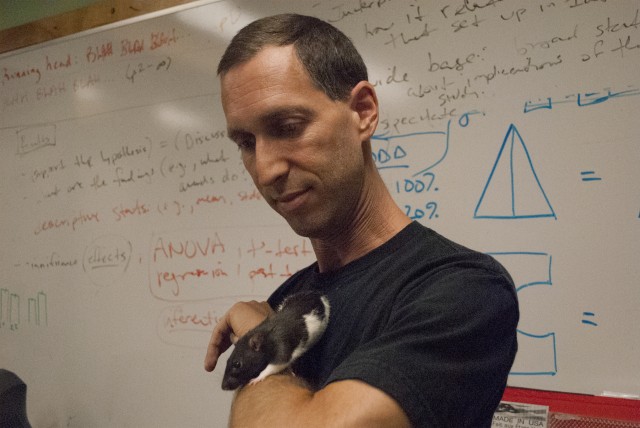It may be no surprise that after three months, the junk food eaters got fat.
But what did strike the researchers is that as the rats gained weight, they lost energy. And they didn’t regain their verve when they started getting healthier food.
The study started with a long period of differentiating the animals’ diets and monitoring their weight. After six months, Blaisdell’s team started setting giving them tasks to perform.
Each rat was placed in a box with a lever that opened a little compartment. At first, the animals had to learn to press the lever to open the compartment and get a drink of sugar water, Blaisdell said. When all the rats had mastered that trick, the researchers made it harder, requiring three presses to open the compartment. Next, researchers demanded progressively more: three presses for the first treat, six for the second, nine for the third and so on.
“At a certain point, you’re going to say, ‘It isn’t worth it. I give up.’ And the question was, when would the rats give up?” Blaisdell said.
Even though all the rats had had their rations cut and were demonstrably hungry when the half-hour long testing sessions began, the fat animals showed little heart for getting the compartment open. The rats on the junk food diet rested nearly twice as long as the lean rats before resuming their attempts to get at the sugar water, Blaisdell said.
An Australian study had noted that when rats lived on the kinds of foods typically served in cafeterias, the parts of their brains that control appetite degraded, but they started to recover when the animals got healthier food over a period of nine days.
Blaisdell thought the something similar would happen with his test subjects when he switched their diets around. But it didn’t.
Even on the healthier diets, the fat rats continued to have trouble sticking to their tasks, and they didn’t lose weight. Likewise, placing the lean rats on the junk food diet for nine days didn't increase their weight noticeably or impair their determination to get at the sugar treats.
This suggests that a long-running junk food diet causes the most physical and mental harm, not just the occasional binge, Blaisdell said. And the findings suggest that diet-induced obesity is a cause, not an effect, of lethargy.
[contextly_auto_sidebar id="8DIq8xzgzJUQuXz3BqsiZOrMfoyqqqA3"]
